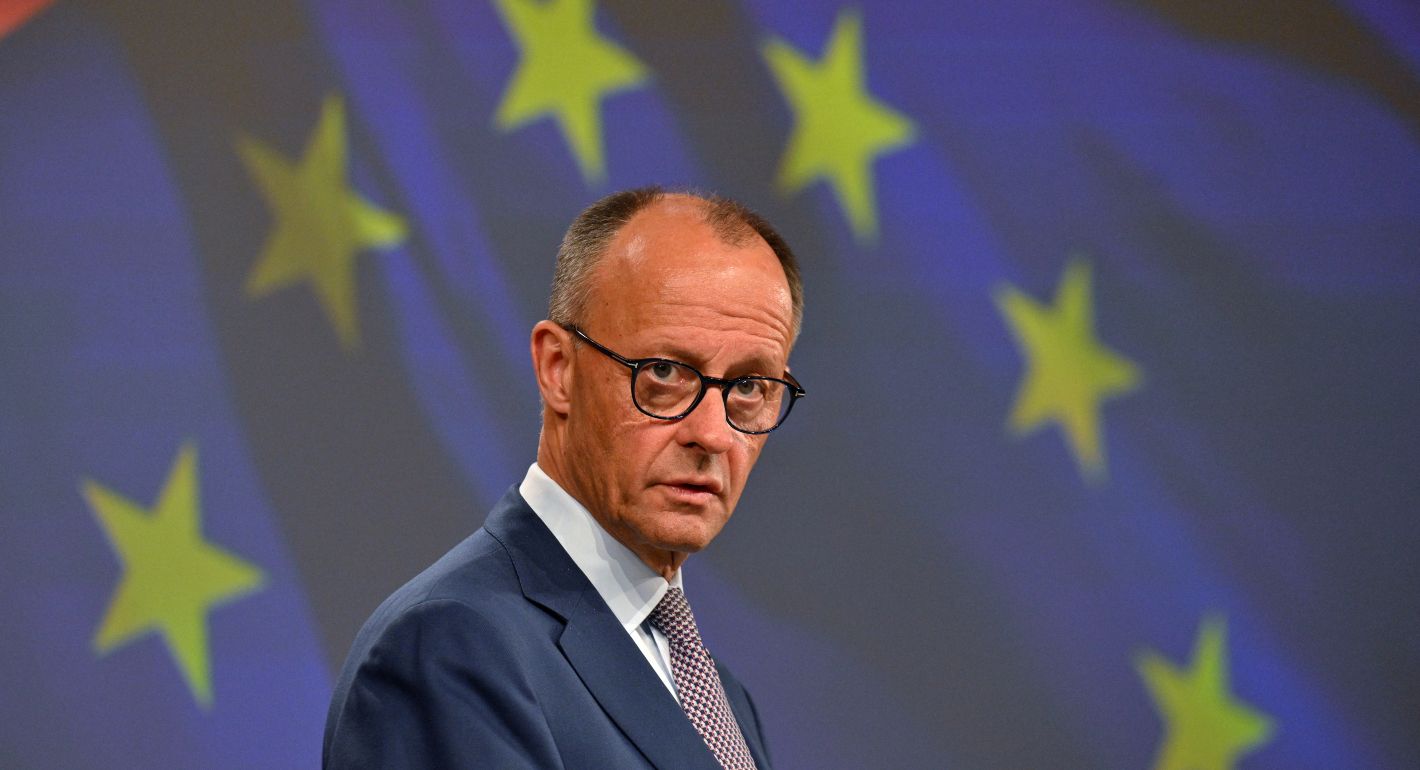Judy Dempsey
{
"authors": [
"Judy Dempsey"
],
"type": "commentary",
"blog": "Strategic Europe",
"centerAffiliationAll": "",
"centers": [
"Carnegie Endowment for International Peace",
"Carnegie Europe"
],
"englishNewsletterAll": "",
"nonEnglishNewsletterAll": "",
"primaryCenter": "Carnegie Europe",
"programAffiliation": "",
"programs": [],
"projects": [],
"regions": [
"Germany",
"Europe",
"United States"
],
"topics": [
"Foreign Policy",
"EU",
"Economy"
]
}
Source: Getty
Germany’s Long-Awaited Pivot to Leading Europe
German Chancellor Friedrich Merz is wasting no time in reshaping Berlin’s role in Europe and farther afield. To achieve his foreign policy objectives, the chancellor must have a strategic outlook and demonstrate conviction.
It’s almost forgotten how Friedrich Merz failed last month to win enough parliamentary votes to be sworn in as chancellor of Germany. His family, who were sitting up in the visitors’ gallery, which has a wonderful view of the parliament’s chamber, were shocked.
Merz quickly regrouped his conservative bloc. So did Lars Klingbeil, leader of the Social Democrats, the junior coalition partner. A few hours later, Merz got the votes for the job he had always craved.
The next day, the new chancellor flew to Paris. Since then, he has been to Warsaw, Rome, Brussels, and Kyiv. He also visited Lithuania, where German troops will be based. And he hosted Ukrainian President Volodymyr Zelensky in Berlin, giving him not only a very warm welcome but also, more importantly, concrete support for developing Ukraine’s armaments industry and even a promise of more weapons. Merz was also unequivocally critical of Russia.
But it is Merz’s visit to U.S. President Donald Trump on June 5 that will test his mettle. The chancellor must build enough of a personal rapport with the American leader to ensure a baseline working relationship while also decisively starting to pull Germany out from under its post-1945 U.S. shadow.
Building that relationship is an uphill battle. Merz has been intensively briefed and coached ahead of his meeting with Trump. But both leaders have tempestuous natures, and Trump, who harbors disdain for the EU, is particularly resentful of Germany’s trade surplus with the United States.
For Merz and his team of advisers, who are experienced European and NATO diplomats, the stakes are clear. The EU has to get more integrated politically and economically and, in the coming years, be able to defend itself with much less U.S. support than it has enjoyed since the end of World War II. Germany, as Europe’s biggest economy, will have to finally deliver on being a central driving force in this overhaul of the fundamentals of the transatlantic relationship.
The urgency of the Copernican revolution needed in the role Germany plays in Europe has been clear in Merz’s statements since his party won the parliamentary election in February.
Ever since the end of World War II, a cornerstone of European construction has been for Germany not to take on any leadership in European defense and military affairs. Instead, America assumed that role, and U.S. oversight and deep involvement were the baseline on which Germany’s security, economic recovery, and path to democracy were founded.
The United States embraced the idea of the European Coal and Steel Community, the precursor to today’s EU that ended centuries of enmity between France and Germany and set the continent on its path of peace, stability, and prosperity.
Today, in a historic twist of events, the Trump administration has pulled that foundation from under his European partners. Merz and his European counterparts have no choice but to step up.
He can do so in several ways. One is to complete the EU’s economic and financial integration, which is now crucial to generate the economic firepower without which the union cannot properly defend and secure its borders or withstand Trump’s trade war.
One part of the equation is finally building a European capital markets union to create a single market for capital in the EU. This would enable the European economic ecosystem to raise funds to keep up and compete with its U.S. counterpart. Germany has opposed this plan since former European commission president Jean-Claude Juncker suggested it in 2014, but the twin challenge of Russia’s security threat and America’s distancing has created renewed momentum for it among EU member states.
The other part of the equation relies on the EU emerging as the bulwark of a rules-based free-trade system in light of U.S. protectionism. It could do so through trade deals with Mercosur, India, New Zealand, and a host of other countries. Merz could drive that push, but he will first have to overcome opposition from his two most crucial European partners: Poland and France. Both countries want to preserve their agricultural sectors, which are vital to their economies.
Trade deals would expand Europe’s influence by bringing other non-European nations into the EU’s orbit at a time when the Trump administration is slapping tariffs on most counties. This is a chance for Germany to show why free-trade agreements are politically and economically important for the EU as a trading and political bloc.
Then there’s defense. Merz can tell Trump that Germany is now prepared to spend the equivalent of 5 percent of its GDP on defense. The chancellor understands the threat from Russia, the need to defend Ukraine, and the imperative to protect Europe. More fundamentally, Merz cannot take for granted the U.S. commitment to NATO. Europe must start looking at how it can defend itself.
Merz’s agenda depends on the EU, which is on the edge of fragmentation. Populist and anti-immigration forces are on the heels of the main political parties or are already in power. The populists are sovereignty-driven movements: They want less EU and more national policies. They want tougher measures to control immigration and asylum seekers. They want to decide on their own values. With the far-right Alternative for Germany now the country’s second-largest political force, Merz has to find ways to weaken the party, which is gnawing at his conservative bloc. He is intent on controlling Germany’s borders and sending back failed asylum seekers.
Can Merz deliver on all these fronts? He has hit the ground running. But he needs support from other EU member states. The victory of a right-wing candidate in Poland’s presidential election, the collapse of the Dutch government, and the rise of France’s National Rally ahead of the 2027 presidential election make it difficult to build coalitions of the willing.
But there is no reason why Merz can’t give the EU and NATO what they need by delivering what has lacked under the previous two chancellors: ambition, strategy, and leadership.
About the Author

Nonresident Senior Fellow, Carnegie Europe
Dempsey is a nonresident senior fellow at Carnegie Europe
- Europe Needs to Hear What America is SayingCommentary
- Babiš’s Victory in Czechia Is Not a Turning Point for European PopulistsCommentary
Judy Dempsey
Recent Work
Carnegie does not take institutional positions on public policy issues; the views represented herein are those of the author(s) and do not necessarily reflect the views of Carnegie, its staff, or its trustees.
More Work from Strategic Europe
- Taking the Pulse: Can European Defense Survive the Death of FCAS?Commentary
France and Germany’s failure to agree on the Future Combat Air System (FCAS) raises questions about European defense. Amid industrial rivalries and competing strategic cultures, what does the future of European military industrial projects look like?
Rym Momtaz, ed.
- Macron Makes France a Great Middle PowerCommentary
France has stopped clinging to notions of being a great power and is embracing the middle power moment. But Emmanuel Macron has his work cut out if he is to secure his country’s global standing before his term in office ends.
Rym Momtaz
- How Europe Can Survive the AI Labor TransitionCommentary
Integrating AI into the workplace will increase job insecurity, fundamentally reshaping labor markets. To anticipate and manage this transition, the EU must build public trust, provide training infrastructures, and establish social protections.
Amanda Coakley
- Can Europe Still Matter in Syria?Commentary
Europe’s interests in Syria extend beyond migration management, yet the EU trails behind other players in the country’s post-Assad reconstruction. To boost its influence in Damascus, the union must upgrade its commitment to ensuring regional stability.
Bianka Speidl, Hanga Horváth-Sántha
- Taking the Pulse: Can the EU Attract Foreign Investment and Reduce Dependencies?Commentary
EU member states clash over how to boost the union’s competitiveness: Some want to favor European industries in public procurement, while others worry this could deter foreign investment. So, can the EU simultaneously attract global capital and reduce dependencies?
Rym Momtaz, ed.









